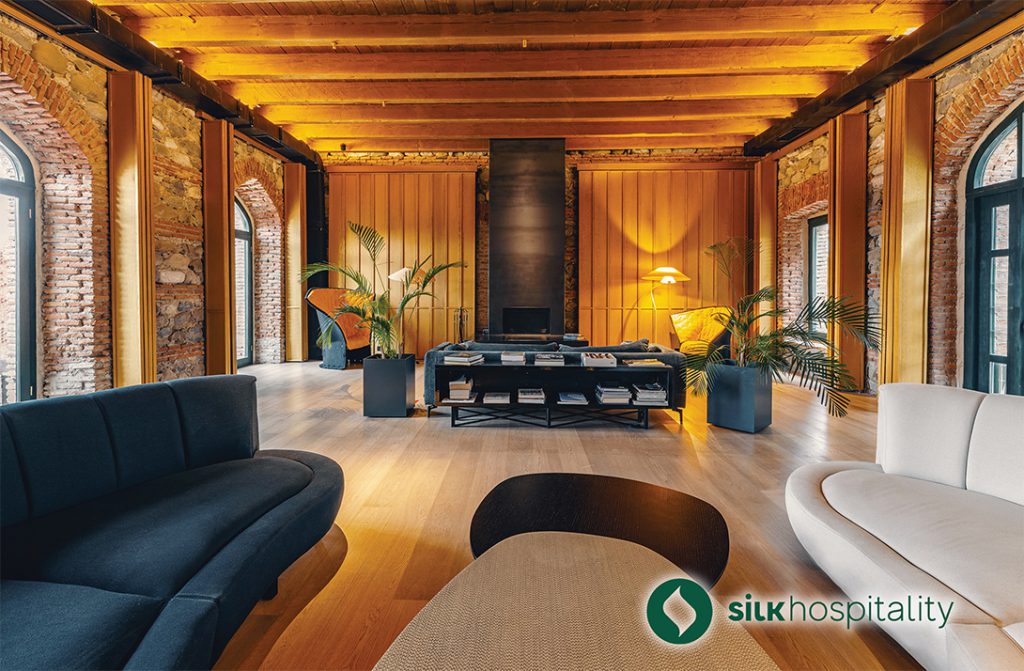Long horizons, local talent and luxurious upgrades: how Silk Hospitality is riding out the pandemic

Silk Hospitality was one of the first to open the doors of its hotels to Covid quarantine guests when it became clear back in March that Georgia wasn’t going to remain a “corona-oasis” for long. But since that period came to an end in June, Silk Hospitality has set its eyes on new challenges and is busy adapting to new circumstances.
One lasting effect of coronavirus on Silk Hospitality, its CEO Jordi Kuijt told Investor.ge, has been to quicken processes that had already been set in motion before the coronavirus pandemic.
This has entailed the consolidation of the Silk Road Group’s assets under Silk Hospitality, gathering management, human resources and administration of the holding company’s hospitality assets under one roof, in addition to overseeing its new services as a hospitality operator.
The process began two years ago, but is still being brought to a conclusion, Kuijt says, noting perhaps the biggest change will entail the inclusion of more local talent into its administration, and the weaning of the holding’s hospitality assets off relying on foreign expertise.
“When I first came to SRG [Silk Road Group], the question was: how can we grow our hospitality holdings and appeal? I said, ‘Only by using local expertise.’ The locals know the people better. Perhaps a decade ago this was less true, and we needed to import expertise from abroad, policies, procedures. But now, 11 years on, we have invested in future talents and can employ them in these roles,” Kuijt explains.
When tourism gets moving again and it has become less daunting to go out for a meal, Silk Hospitality assets will be staffed more than ever before by local Georgian talent.
But why move in this direction amid a global pandemic?
Local talent, Kuijt says, will help the holding pursue an aim that the global tourism industry is facing as an inevitability, but one which Silk Hospitality has decided to tackle as a welcome and much-needed change: that of pivoting to local clients and customers.
For example, Filini, the Italian restaurant and café located on the premises of the Radisson Blu Iveria Hotel, has enough space to feed 500 guests at breakfast. However, Kuijt says, this model of quick and industrial dining is one that leaves much to be desired, especially for local diners, who, if they come at all, will come to a hotel restaurant strictly for the atmosphere and food—not because they are captive in the hotel to begin with.
Now that hospitality venues have to make due without foreign tourists, attracting local clients is vital. This means that instead of spaces which are limited (by the aesthetics of their design) to feeding hundreds of guests, such areas should be used, Kuijt suggests, as communal spaces where people are brought together, not processed.
Hotels have to pivot to the local consumer, Kuijt says, and it’s not simply a matter of the pandemic.
“Why should someone pay 25-30 dollars for breakfast, when around the corner they can have an authentic meal, and a more exciting experience? Don’t expect your audience to come to you at that price. The future of restaurants needs to be locally based and oriented, because whatever happens, it is the locals that will come—then you can count on a solid future in the business.”
The focus on local customers went into the design of Silk Hospitality’s Republica complex on First Republic Square (formerly known as Rose Revolution Square) across the way from the Radisson Blu, including a modern take on a Georgian diner, Republic 24, the menu of which is curated by renowned Georgian chef Tekuna Gachechiladze. The facility also includes a concert space and rooftop lounge and restaurant.
The coronavirus pandemic has not been a time for Silk Hospitality to slow down, shutter up and stop its operations. Instead, Silk Hospitality has chosen to take this time to reassess its long-term horizon, and prepare for a post-coronavirus world.
Part of this process has been to further roll out hospitality-management services in response to an uptick in industry exits:
“If people want to get out of hospitality now, which some people are thinking of doing because the business was purely an investment to begin with, then we would say okay, don’t sell your investment, because we can manage it, and it will cost you just a fraction of what you pay now,” Kuijt explains.
As for its own assets, Silk Hospitality has been steadily investing in upgrades and improvements during the downturn, including the installation of a large, four-season pool (!) at the Radisson Collection Hotel Tsinandali with a retractable roof, experimenting with tech to connect staff and clients on the Tsinandali Estate, and continued work on Тelegraph Hotel, which will see one of Tbilisi’s hallmark buildings on Rustaveli transformed into a 220-room, five-star hotel by 2023-2024.
When asked why Silk Hospitality chose such uncertain times to plow ahead with ambitious plans, Kuijt says the answer is simple:
“Anything in hospitality and tourism, any business idea or plan, is long-term. A healthy long- term vision is five to 10 years. If you don’t understand that, you shouldn’t get into the business. There is no return on an investment by tomorrow, or even in one year.”


